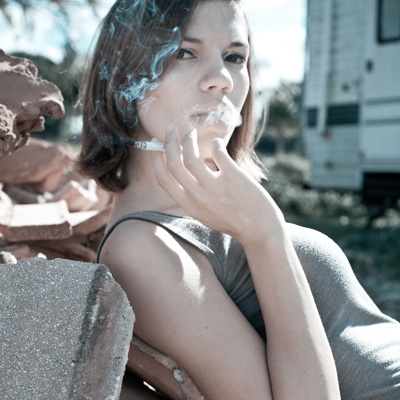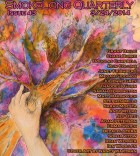What was your inspiration for “Other Damage”? How did you come up with the idea?
I was working on this other story that, for some reason—I can’t even remember what—I wanted some quantum mechanics in there, possibly just to spice it up a little. So I went down this crazy research wormhole and the story just turned into a complete clusterfuck. It was one of those stories where I was looking for other stuff to do just because I started hating it so much. Around that time, though, I read Margaret Atwood’s “Happy Endings,” and it dinged a bell for me: I was like, “Good Lord, this structure is pretty much built for weird quantum theory stuff.” So I shamelessly copped it. Basically, I thought of the worst thing someone could say about someone else and then went from there, repercussions-wise.
I love the idea that this story is predicated upon: that in each moment there are infinite combinations of possibilities for the future. Was it difficult to write about a topic that could go in so many different directions?
One time I heard someone say that writing fiction is the act of “what if,” and that certainly seems true for me. I actually had a really good time with this story, because the conceit allowed me to ask “what if” a whole bunch of times and fiddle around with whatever outcomes I could imagine—really, this story could have been infinitely long, I guess, but it would probably get boring after a while.
I don’t really think of writing fiction as difficult, per se, because I think that makes it seem like less fun than it is, but if there was a difficulty to writing this it was that the danger of being boring was particularly high—I really nerd out on the science aspect of this piece, and I had to be sort of conscious to let the science serve the story and not the other way around. Certainly, I’m not the first dude to get his mind blown by Many Worlds theory.
Another strength of this story, I think, is that despite all of the possibilities available to the characters in this story, they are also limited by their own shortcomings. Was that something you thought about as you imagined the “possible universes”?
You know, I do believe people can change, but I also think the progression of time, in my own life at least, to some extent represents the narrowing of possibilities. We get locked into habits, career paths, neuroses, whatever. And so it occurs to me that if this story had begun at the moment of Stephen’s birth it might have been a more positive story. Then again, probably not, because sad things are more interesting than happy things—no conflict, no story—so while even in the story there were a few potentially happy probabilities for Stephen, I just glossed them over in favor of the juicy bits.
The final image of this story is so powerful in light of all of the many possibilities for her. Do you think we all, like Sarah, could be a “millisecond away” from collision?
Yeah, perhaps so, although I think real life is mostly more mundane. I mean, a 747 could plow through my house two seconds from now and wipe me out—and maybe in some other universe that’s happening—but for now I’m just sitting at my desk thinking about myself, which is what I think most of us spend most of our time doing. It’s also possible that I’m just particularly self-involved. But it is a compelling moment, isn’t it? That second before the hammer falls and you realize, fiddlesticks, I should have done things differently.
It’s like Milan Kundera says, that a funny thing about life is that it’s fundamentally impossible to learn anything from it—you can only make a decision once given a set of variables, and you’ll never get to make it under those same circumstances again, and in that way life is more or less a process of making blind judgments in the dark and hoping you don’t fuck it up too badly. So maybe it’s comforting to think that, somewhere, in some other universe, you’re making better life-choices.



 The core workshop of SmokeLong Fitness is all in writing, so you can take part from anywhere at anytime. We are excited about creating a supportive, consistent and structured environment for flash writers to work on their craft in a community. We are thrilled and proud to say that our workshop participants have won, placed, or been listed in every major flash competition. Community works.
The core workshop of SmokeLong Fitness is all in writing, so you can take part from anywhere at anytime. We are excited about creating a supportive, consistent and structured environment for flash writers to work on their craft in a community. We are thrilled and proud to say that our workshop participants have won, placed, or been listed in every major flash competition. Community works.